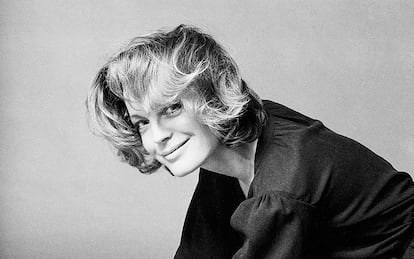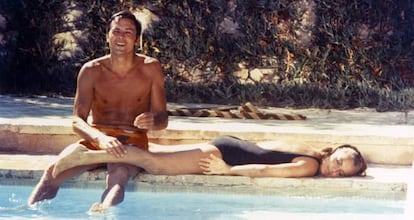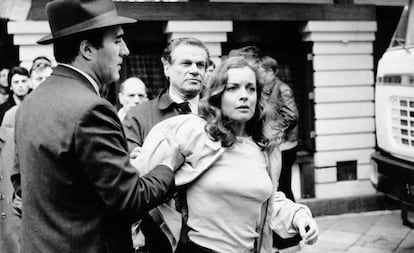Romy Schneider, the empress of free women
A documentary about the iconic actress and a new movie about Elizabeth of Austria, who she portrayed in the ‘Sissi’ trilogy, have both premiered at Cannes


Romy Schneider said that she owed it all to Luchino Visconti. The actress, born in Vienna in 1938 and who died in Paris 43 years later, was referring to how the director of The Leopard saw something more in her than the beautiful girl who starred in Ernst Marischka’s Sissi trilogy of films about the Empress Elisabeth of Austria that enchanted the world in the late 1950s, and subsequently Alain Delon. In 1961, Delon and Schneider were Europe’s golden couple and Visconti, on the urging of the French actor, cast them together in the play ‘Tis Pity She’s a Whore, by the Elizabethan playwright John Ford, about an incestuous love affair that ends in a massacre.
Neither Delon nor Schneider had ever been on stage before, but the play was such a success that those who saw it still remember the sparks flying between that perfect pairing at the Théâtre de Paris. Visconti said he only agreed to put on the play to be able to work with them both and to unleash through them some of the most unharnessed passions. The old Communist aristocrat knew a lot about such things.
Schneider is the focus of an ongoing exhibition and retrospective at the Cinémathèque Française, and a documentary about her life by Lucie Cariès, Romy Femme Libre, has premiered at the 2022 Cannes Film Festival. Also screening at the festival last weekend was Corsage, by Austrian director Marie Kreutzer. Starring Vicky Krieps, Kreutzer’s movie explores the decadence and rebelliousness of Elisabeth of Austria, portraying a heroin-addicted Sissi who smokes and is fed up with men and the world, obsessed with her weight and her public image, capricious, who tattoos her body and has suicidal impulses, and who has a closer relationship with her dogs and her horses than with most humans. Kreutzer’s psychological portrait plays on those anachronisms that Sofia Coppola inaugurated to a pop soundtrack in Marie Antoinette, the occasional extemporaneous object and an enveloping mise-en-scène that takes full advantage of the scars of the past still present in the palaces where the movie was shot.

Romy Femme Libre is perhaps not a great documentary, but it is of little matter. There is a wealth of little-known material and anybody could spend hours looking at photographs and listening to interviews with a woman whose spontaneity and photogenicity remain unparalleled. In one of the in movie’s best segments, Schneider remarks: “I’m bored of looking at myself in the mirror.” Hers was a face in which old and new Europe merged as never before, to the extent that a palate as refined and complex as Visconti’s could not overlook it.
Schneider’s parents were actors and following in their footsteps was for her something more than a vocation: it was a necessity. Both were supporters of Adolf Hitler, and even feature in home-shot movies with the Führer. They spent summer near his residence and Magda Schneider was one of Hitler’s favorite actresses. When the Second World War ended, Schneider’s parents found themselves out of work and it took many years for the stigma to be erased. It was Magda who encouraged Romy to act alongside her, and they played mother and daughter in the Sissi trilogy. But at the same time, Magda’s star was on the wane, Romy’s began to shine and her role as the empress turned her into a popular icon of the late 1950s.

Non-conformist and, as the documentary title states, profoundly free, Schneider soon felt the need to spread her wings and seek a change of scenery. It would be a recurring theme throughout her life. When she moved to Paris, her career took a radical turn. She met Delon, who was not as famous as her at that time, and the clash of social classes led to a tempestuous relationship that only over the passage of time resulted in a fresh understanding sealed with the 1969 Jacques Deray classic The Swimming Pool, which brought them back together through Delon’s insistence.
Schneider was always upfront and never attempted to hide her family’s past links to the Nazis. In fact, it became one of her most intense crusades. She spoke about it publicly and made a point of acting in films about the Holocaust. Her work under the tutelage of Claude Sauset in the 1970s became the movies that best shaped her career and her profile as a liberated woman who never tired of anybody, including feminist movements. She had husbands and lovers, she never identified as Austrian, German or French and, without ever losing her radiant smile, she went about doing her best to do whatever she wanted.
Parallels with Sissi haunted Schneider like a fatal destiny. Elisabeth of Austria will always be associated with Schneider’s teenaged face, but Kreutzer’s movie concentrates on the same dark recesses as Visconti explored in Ludwig (1973), in which Schneider reprised her historical character during Elisabeth’s descent into decadence. Idealized for her beauty, the empress went down in history as a very controversial figure due to her excesses and her fight against her own body. In Corsage, she is a 40-year-old woman humiliated by her age and changes to her physiognomy, which she punishes with the garment of the title. The deaths of her first-born daughter in infancy and her son Rudolf, heir to the throne, in suspicious circumstances (there has been speculation Rudolf committed suicide) led her into a chronic depressive state. Schneider also experienced that pain when her son, David, was involved in a horrific accident.

Harry Meyen, Schneider’s first husband, killed himself in 1979. He also suffered from chronic depression as a result of being tortured by the Nazis as a youth. In July 1981, at the age of 14, the couple’s son David, named in honor of the Jewish people, died after trying to climb a spiked fence at his stepfather’s home in Paris. He slipped and punctured his femoral artery. Schneider’s life was destroyed. She became addicted to pills and alcohol and suffered mental health issues, dying a year later at her home on May 29, 1982, at the age of 43. Although suicide was suspected, it was ruled out by an examining magistrate and cardiac arrest was recorded as the cause of death. During the filming of her final movie, The Passerby, she had asked for an in memoriam to be added to the credits: “For David and his father.”
Sissi, who had been looking for a lover for her husband, Emperor Franz Joseph I of Austria, so as to avoid her matrimonial obligations, spent her later years wearing a black veil over her face. She was assassinated by Italian anarchist Luigi Lucheni in Geneva on September 10, 1898, with a needle file that was so thin the empress initially thought it was just a scare and continued on her way. Shortly afterward, as she boarded the steamship Genève, she collapsed.
Tu suscripción se está usando en otro dispositivo
¿Quieres añadir otro usuario a tu suscripción?
Si continúas leyendo en este dispositivo, no se podrá leer en el otro.
FlechaTu suscripción se está usando en otro dispositivo y solo puedes acceder a EL PAÍS desde un dispositivo a la vez.
Si quieres compartir tu cuenta, cambia tu suscripción a la modalidad Premium, así podrás añadir otro usuario. Cada uno accederá con su propia cuenta de email, lo que os permitirá personalizar vuestra experiencia en EL PAÍS.
¿Tienes una suscripción de empresa? Accede aquí para contratar más cuentas.
En el caso de no saber quién está usando tu cuenta, te recomendamos cambiar tu contraseña aquí.
Si decides continuar compartiendo tu cuenta, este mensaje se mostrará en tu dispositivo y en el de la otra persona que está usando tu cuenta de forma indefinida, afectando a tu experiencia de lectura. Puedes consultar aquí los términos y condiciones de la suscripción digital.








































